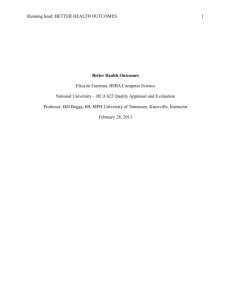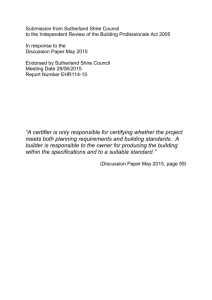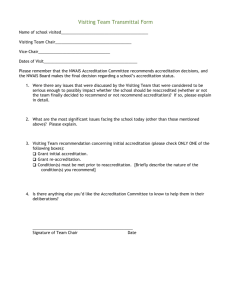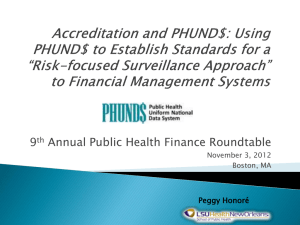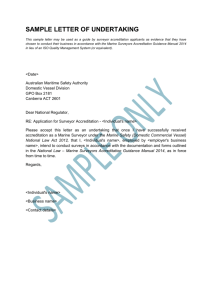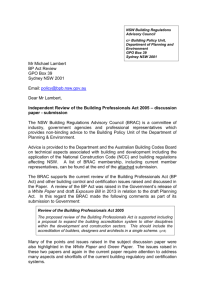Submission - Shoalhaven City Council
advertisement
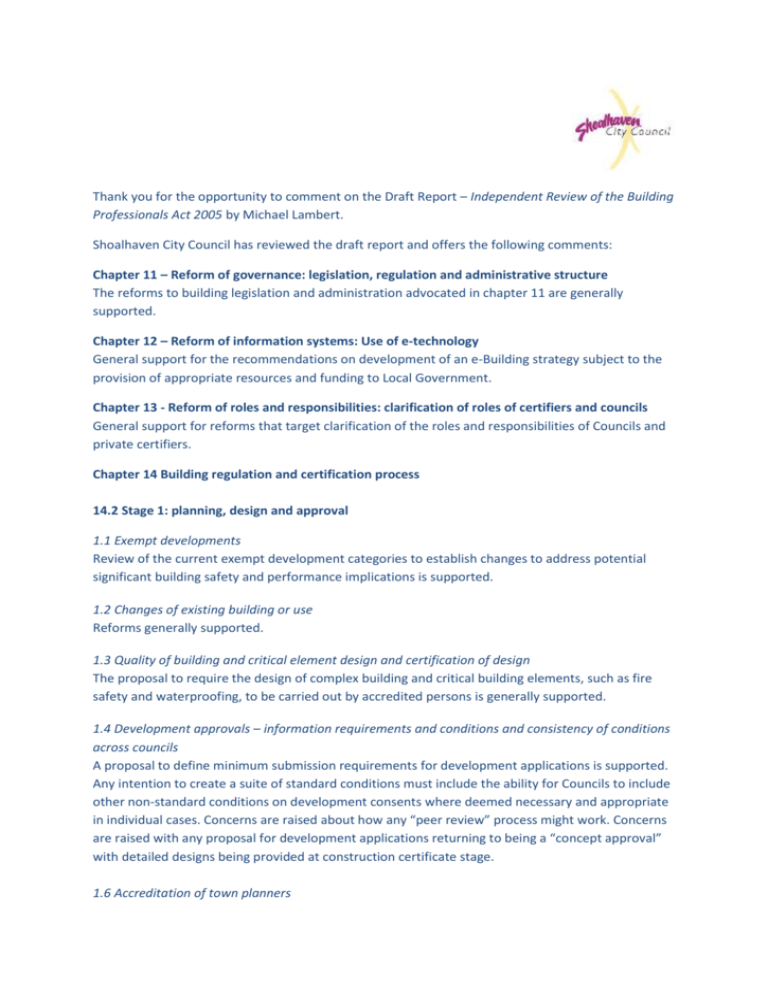
Thank you for the opportunity to comment on the Draft Report – Independent Review of the Building Professionals Act 2005 by Michael Lambert. Shoalhaven City Council has reviewed the draft report and offers the following comments: Chapter 11 – Reform of governance: legislation, regulation and administrative structure The reforms to building legislation and administration advocated in chapter 11 are generally supported. Chapter 12 – Reform of information systems: Use of e-technology General support for the recommendations on development of an e-Building strategy subject to the provision of appropriate resources and funding to Local Government. Chapter 13 - Reform of roles and responsibilities: clarification of roles of certifiers and councils General support for reforms that target clarification of the roles and responsibilities of Councils and private certifiers. Chapter 14 Building regulation and certification process 14.2 Stage 1: planning, design and approval 1.1 Exempt developments Review of the current exempt development categories to establish changes to address potential significant building safety and performance implications is supported. 1.2 Changes of existing building or use Reforms generally supported. 1.3 Quality of building and critical element design and certification of design The proposal to require the design of complex building and critical building elements, such as fire safety and waterproofing, to be carried out by accredited persons is generally supported. 1.4 Development approvals – information requirements and conditions and consistency of conditions across councils A proposal to define minimum submission requirements for development applications is supported. Any intention to create a suite of standard conditions must include the ability for Councils to include other non-standard conditions on development consents where deemed necessary and appropriate in individual cases. Concerns are raised about how any “peer review” process might work. Concerns are raised with any proposal for development applications returning to being a “concept approval” with detailed designs being provided at construction certificate stage. 1.6 Accreditation of town planners Accreditation of privately practicing town planners would increase levels of accountability and is generally supported. 1.7 Peer review and decision support A system of submission of alternative solutions and critical building elements to a peer review panel is cautiously supported subject to concerns about timeframes and costs. 1.8 Section 96 approvals There are significant concerns about the introduction of mandatory turnaround times for Section 96 applications. The current review needs to seriously consider case law in NSW related to Section 96 applications that has significantly broadened the concept of what is consisted to be “substantially the same development”. 14.3 Certification to allow commencement of building work 2.1 Clarity of requirements for issue of construction certificates or CDC Proposed reforms to improve construction certificate and CDC documentation and process are generally supported. 2.2 Need for consistency in the CC and CDC process and sufficient supporting information As above in 2.1. 2.3 Assessment and certification of alternative solutions The proposed reforms to the assessment and administration of alternative solutions is generally supported. 2.4 The ‘not inconsistent’ test The proposed move away from ‘not inconsistent’ to ‘consistent’ with formal criteria in legislation is supported. 2.5 Distinction between certifying authority and principal certifying authority Retaining the status quo of having separate categories for certifying authority and principal certifying authority is supported. 2.6 Accessibility of building plans The proposal to have fully specified building plans at CC stage is generally supported but may be an onerous and costly task that might outweigh the benefits in some cases, such as class 1 and 10 buildings. If this was to occur for Class 1 and 10 buildings it should be done on the basis that the plans can only be prepared by appropriately accredited persons. If this is not the case, certifiers will experience delays and costs associated with non-compliant building plans submitted in CC and CDC applications. 2.7 Building in stages Generally support the concept that where a building is constructed and certified in stages the certifier taking full account of and documents the proposed work’s relationship with the overall project. 2.8 Implications of the Burwood Council versus Ralan Case Support a review by the DPE of the legal and policy implications of this court case. 2.9 Conditions for CC and CDC Some flexibility for certifiers in applying conditions on CC and CDC is supported. 14.4 Building construction stage 3.1 Specific matters impacting on strata and community title developments It should be noted that in some cases strata and community title subdivision of these developments does not occur at DA and CC stage and that this may allow the proposed reforms to be circumvented. 3.2 Improved information for the community There is insufficient information provided on the proposed ‘electronic noticeboard’ to comment in detail however there is merit in ensuring that the project information is readily available to the community. It is unclear how the information on exempt development would get onto the ‘electronic noticeboard’. 3.3 Adequacy of mandatory building inspections Proposed reforms are generally supported. The purpose of reporting missed critical stage inspections to the Council and the BPB is unclear. In many cases it is not possible to undertake the inspection after the critical stage inspection has been missed, particularly if, for example, concrete has been poured. Detailed guidance needs to be provided to certifiers on how the certifier can be satisfied that the works are satisfactory and can proceed. There also needs to an indemnification for certifiers against claims for costs associated with missed inspections. This is necessary where an inspection has been missed and where invasive works are ordered, such as removal of wall cladding to inspect framework, but where no defects are found and the works are found to be satisfactory. 3.4 Improving the certification process for critical building elements The proposal to require building professionals who design, install or commission critical building elements to be suitably accredited, have professional indemnity insurance and to certify their work is supported. 3.5 Fire safety schedules There is insufficient information stated on the proposed reform to fire safety schedules to comment. 14.5 Issue of Occupation Certificates 4.1 Clarifying criteria for the issue of an occupation certificate The concept of a ‘Development Completion Certificate’ for a DA and CDC is supported. There are however concerns about an OC being able to be issued prior to the Development Completion Certificate and only considering if a ‘building is safe and fit for its approved use’. Will the OC only consider BCA matters or will it extend to matters required by the development consent that need to be in place before the development commences, such as car parking, road access and the like? If not the use of a building may be authorised by an OC but other critical matters contained in the development consent may not be in place and the use of the building may be inappropriate and unsafe. 4.2 Issue of development completion certificates where there is unauthorised works Reforms to address unauthorised works, including penalty fines that act as a disincentive are supported. The removal of the building certificate path to ‘regularise’ unauthorised works is also supported. It is unclear how the Development Completion Certificate will address unauthorised work generally but particularly where the unauthorised works are not related to a DA or CDC. 14.6 Building information and maintenance regulation The concept of the ‘building manual’ as proposed in the Planning White Paper is generally supported. Provision of these documents online utilising e-Technology is also supported. Shoalhaven City Council currently requires building owners and managers of relevant buildings to submit annual fire safety statements in accordance with the current requirements of the Environmental Planning and Assessment Act and Regulation. The two most significant difficulties with the current requirements are the responsibility of the owners/managers to nominate a competent person to certify the fire safety measures and the lack of any form of accreditation/qualifications/experience requirements on persons carrying out such works. It is considered that persons certifying annual fire safety measures in existing buildings be required to hold specific qualifications and accreditation by the BPB. 14.7 Fire safety certification and review The proposed reforms on the design, installation, commissioning and maintenance of fire safety systems is supported. 14.8 Subdivision and strata certification Extending private certification to include subdivision and strata certification is not supported. 14.9 Other building regulation issues Licensing of commercial builders The assessment of this issue in the report acknowledges that NSW is unique amongst other States and Territories in not requiring licensing of commercial builders and dismisses any need to extent such licensing requirements on the basis that owners/developers are able to assess the capability and capacity of builders. This seems at best a superficial assessment that does not acknowledge the important role of the builder in these types of developments and the need to ensure that the builder is suitably qualified and experienced to carry out the works. This is also an important issue for the Certifier who, to a significant extent, relies on the competence and integrity of the builder. Consideration should be given to extending the current licensing provisions to commercial builders or alternatively requiring all builders, residential and commercial, to be accredited by the BPB. The licensing/accreditation of commercial builders is considered an important issue in smaller commercial developments where owners/developers may not be as knowledgeable and a greater reliance is placed on the builder. Access to Australian Standards Current access to Australian Standards is restricted by cost and any future move to free access in line with the NCC is supported. Interpretation of Australian Standards and NCC Both proposed reforms are supported. Chapter 15 Reform of accreditation, accountability, discipline and support of certifiers 15.2 Accreditation of certifiers Qualified support for the proposal to extend the range of professional and academic qualifications for building certifiers subject to knowledge gap identification and training programs. Support the proposal to expand the accreditation scheme to recognise nationally recognised training organisations. Support work to develop tools to assess certifier’s knowledge and to assist in moving to higher levels of accreditation. Support the proposal to increase accreditation periods from 1 year to 3-5 years. Support the development of an online system for the accreditation system Support the proposal to introduce a fit and proper test for all persons in companies providing certification services. 15.3 Scope of Accreditation The proposal to increase the scope of accreditation to include building plans, the design, installation and commissioning of critical building envelopes and systems and town planning is generally supported. 15.4 Accountability of certifiers It is unfortunate that the scope of the review has not seriously considered whether private certification is an appropriate option to retain. This system has been in place in NSW for over a decade and has been continually the subject of reviews and changes to try and address the problems with a system that is arguably fundamentally flawed. Proposals to include development of a practice guide and a proactive investigation and auditing program by the BPB are supported. Retaining of the mandatory contract for certification services for Councils is not supported. Tentative support to the creation of a tripartite partnership arrange between certifiers, councils and the State. 15.5 Handling of complaints and disciplining of certifiers The proposed reforms to the complaints/disciplining procedures for certifiers is generally supported. 15.6 Education and training The recommended reforms to improve the education and training opportunities for certifiers are supported. It is also important that training programs are more accessible, with greater use of online delivery, and are affordable. Council has a significant number of certifiers and training costs associated with accreditation CPD requirements are significant. 15.7 Other support for certifiers The establishment of a hot line enquiry service, and advisory and reference panels to assist certifiers is supported. 15.8 Certifying fees The development of an indicative fee structure for certification services and the requirement for private certifiers to publish their fee structure is supported. 15.9 Competitive neutrality Agreed that competitive neutrality between Council and private certifiers will not be achieved under the current arrangements. A requirement for private certifiers to publish their fee structures will however assist. 15.10 Professional indemnity insurance No comment 15.11 Improving the supply and career path of certifiers Shoalhaven City Council is a large regional Council that employs approximately 15 certifiers that provides certification services for all Classes of buildings. Since the introduction of accreditation for Council certifiers there has been a noticeable decrease in the availability of suitably qualified, experienced and accredited candidates to fill vacancies that have arisen over that time. So much so that Council has in the past had to employ non-accredited persons and invest significant amounts of time and money on training to enable these staff members to obtain the necessary levels of accreditation. In order to address this shortfall of available candidates as vacancies arise, Council has recently moved to employ a cadet building surveyor. The proposed reforms outlined in the report are generally supported and, particularly from Council’s perspective, any incentives to encourage the provision of additional trainee positions are welcomed. Chapter 16 Reform of the resourcing and funding of building regulation and certification Council’s experience in the past has been that compliance work is expensive, resource hungry and not self-funding. The proposal of a levy on DA and CDC applications, coupled with revenue from PINS, to provide adequate funding for compliance is considered to be an option worth further consideration.
